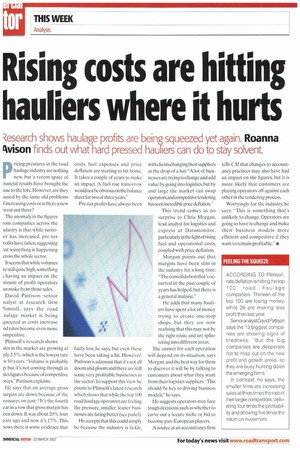Rising costs are hitting hauliers where it hurts
Page 20

If you've noticed an error in this article please click here to report it so we can fix it.
Research shows haulage profits are being squeezed yet again. Roanna
qvison finds out what hard pressed hauliers can do to stay solvent ricing pressures in the road haulage industry are nothing new, but a recent spate of nancial results have brought the ;sue to the fore. However, are they aused by the same old problems f increasing costs or is there anew hreat out there?
The anomaly in the figures tom companies across the -idustry is that while turnoer has increased, pre-tax rofits have fallen,suggesting at something is happening cross the whole sector.
It seems that while volumes re still quite high, something ; having an impact on the mount of profit operators an make from those sales. David Pattison, senior nalyst at research firm 'limsoll, says the road aulage market is being queezed as costs increase nd rates become even more ompetitive.
Plimsoll's research shows ales in the market are growing at nly 3.5%, which is the lowest rate 3r 10 years. "Volume is probably p, but it's not coming through in ales figures because of competitive Jives," Pattison explains.
He says that on average gross iargins are down because of the ressures on cost: "It's the fourth ear in a row that gross margin has een down. It was about 20% four ears ago and now it's 17%. This bows there is some evidence that costs, fuel expenses and price deflation are starting to hit home. It lakes a couple of years to make an impact. A fuel rise tomorrow would not bc obvious on the balance sheet for two or three years."
Pre-tax profits have always been fairly low, he says, but even these have been taking a hit. However, Pattison is adamant that it's not all doom and gloom and there are still some very profitable businesses in the sector. To support this view he points to Plimsoll's latest research which shows that while the top 100 road haulage operators are feeling the pressure, smaller, leaner businesses are faring better (see panel).
He accepts that this could simply be because the industry is fickle, with clients changing their suppliers at the drop of a hat: "A lot of businesses are trying to change and add value by going into logistics, but by and large the market can swap operators,and competitive tendering has seen incredible price deflation."
This trend comes as no surprise to Chris Morgan, lead analyst for logistics and express at Datamonitor, particularly in the light of rising fuel and operational costs, coupled with price deflation.
Morgan points out that margins have been slim in the industry for a long time: "The consolidation that's occurred in the past couple of years has helped, but there is a general malaise."
He adds that many hauliers have spent a lot of money trying Lo create one-stop shops, but they are now realising that this may not be the right route and are splintering into different areas.
The answer for each operation will depend on its situation, says Morgan. and the best way for them to discover it will be by talking to customers about what they want from their logistics suppliers. "This should be key to driving business models," he says.
He suggests operators may face tough decisions.such as whether to carve out a secure niche or bid to become pan-European players.
A source at an accountancy firm tells CM that changes to accountancy practices may also have had an impact on the figures, but it is more likely that customers are playing operators off against each other in the tendering process.
Worryingly for the industry, he says: "This is something that's unlikely to change. Operators are going to have to change and make their business models more efficient and competitive if they want to remain profitable." •


























































































































































































